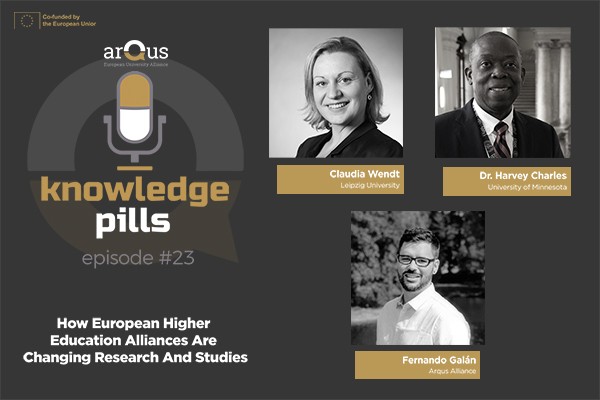Would you like to know how European Universities are changing the current research and education models across the continent? The new Arqus Knowledge Pills’ podcast episode “Bologna 2.0.? How European Higher Education Alliances are changing Research and Studies?” is already available!
Alliances in European Higher Education are built to transform studying in every European country, ignoring barriers in language, between disciplines and institutions. They aim to establish a way to study transnationally, in multiple countries and institutions and therefore integrate the European labor market with a sustainable approach.
There are already 50 European University Alliances, including more than 400 institutions in 35 different countries in Europe. These Alliances are meant to change the process of teaching and learning drastically while making it more global, more mobile and more independent of the teaching style of specific universities. Which chances can be taken? What kind of difficulties come with it?
These and other topics are discussed in the new Arqus Knowledge Pills’ podcast episode “Bologna 2.0.? How European Higher Education Alliances are changing Research and Studies?”. The podcast was recorded during the Leipzig Science Festival Globe 2023 with Fernando Galán, Arqus Consortium Manager, Harvey Charles, Member of the Arqus International Advisory Board and Vice Provost for International Affairs at the University of Minnesota, and Claudia Wendt, PhD candidate at the Institute for Higher Education Research of Leipzig University.
https://open.spotify.com/episode/2YHyRcxU7Oaagmx5EIuYm3
Learn more about the speakers:
- Claudia Wendt
Claudia Wendt has been a PhD student in the Research Training Group “Science Management and Science Communication (WiMaKo)” at the Institute for Higher Education Research since 2020. She is writing her doctoral thesis on the conditions for success in international university cooperation, using the example of the European University Alliances.
She is a student of Leipzig University. In 2011, she finished her master’s degree in Educational Science with a focus on adult education, as well as Journalism and American Studies. She then became a project manager and research assistant for a joint project on the quality development of studies and teaching in the context of increasing student diversity at the University of Magdeburg. Since 2019, she works as a faculty manager for the Faculty of Mathematics and Computer Science at Leipzig University while also finishing her doctorate.
- Dr. Harvey Charles
Dr. Harvey Charles is currently Vice Provost for International Affairs at the University of Minnesota. In this role, he leads the Global Programs and Strategy Alliance and advances the University as a global leader in international teaching, research, and outreach.
He is an experienced leader of international programs in higher education and a scholar in the field of international education. He earned his Ph.D. in higher education and student affairs from the Ohio State University. He has published on subjects including comprehensive internationalization, internationalizing the curriculum, and leadership in international education. He has served as Chief International Officer at multiple institutions around the US and is the former President of the Association of International Education Administrators.
- Fernando Galán
Fernando Galán is the Consortium Manager of the Arqus European University Alliance and has over 10 years of experience working on European higher education policies.
Before joining Arqus, Fernando was head of international engagement at the Spanish Rectors’ Conference (Crue Universidades Españolas). He has also worked as a policy officer at the European Association of Higher Education Institutions and served as President of the European Students’ Association. Fernando has contributed to relevant documents at the European level in the field of higher education, such as the European Standards and Guidelines for Quality Assurance in the Higher Education Area, several EU initiatives and the work of UNESCO and the Council of Europe on the recognition of qualifications. He frequently speaks and publishes on the topic of European higher education policies.
The episodes of the “Arqus Knowledge Pills” are published on a regular basis and can be subscribed to on Spotify and other platforms (see below). Doriane Duvault (Université Claude Bernard Lyon 1) and Josephine Petzold (Leipzig University) are the moderators that lead listeners through each episode.
